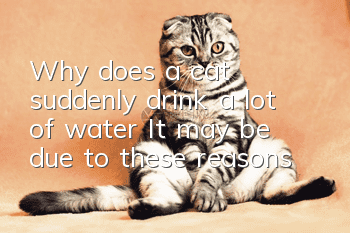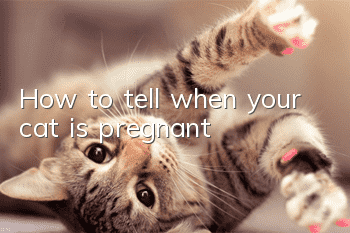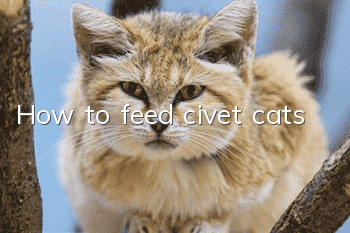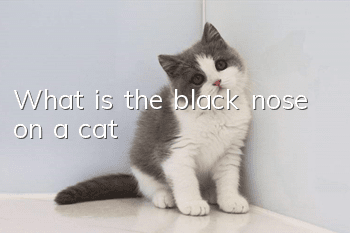Why does a cat suddenly drink a lot of water? It may be due to these reasons!

Cats drinking water
Water is an indispensable component of the body. Every living thing needs a large amount of water reserves every day to maintain normal metabolism. At certain times, such as when cats go out for exercise, Or the weather is hot in summer, water evaporates quickly, and water needs to be replenished in time. Cats will drink a lot of water. But sometimes, cats have poor mental status and suddenly drink a lot of water, which often requires the attention of owners.
Cats drinking a lot of water in abnormal conditions are mostly because they are sick. In addition, it may also be due to changes in food types, eating too much, etc. Of course, in terms of feeding, food that is too salty and tastes unpleasant may also cause cats to drink a lot of water. Generally speaking, the pathological causes of cats drinking a lot of water are as follows: acute gastroenteritis, viral infection, gastroduodenal disease Ulcers, renal insufficiency, diabetes, etc.
1. Acute gastroenteritis
Symptoms and characteristics:
The affected cat feels thirsty and lies by the water bowl without drinking. Or vomiting occurs immediately after drinking. The vomitus contains blood streaks and yellow-green liquid. The animals showed high levels of dehydration, sunken eyeballs, and decreased skin elasticity. The frequency of defecation increases, the feces is thin and smelly, and a large amount of feces sticks around the anus. The animal resists abdominal examination and may show symptoms of vomiting when the stomach is palpated.
How to treat?
The basic principle is to remove irritating factors, provide measures to promote mucosal recovery, and correct dehydration. First of all, the diet should be restricted and a small amount of sugar, salt and rice soup should be fed, in small amounts many times. Feed high-sugar, low-fat, low-protein, easily digestible liquid food. Anticholinergic drugs can reduce gastric motility and spasm, reduce the excitation of parasympathetic nerves in the smooth muscle of the gastric wall, reduce gastric acid secretion and relieve vomiting. 5% glucose saline can be given, 40 to 60 ml per kilogram of body weight per day. To replenish lost body fluids. For general gastritis, take metoclopramide tablets orally, 2 to 3 times a day, 0.5 mg per kilogram of body weight each time. At the same time, streptomycin is injected intramuscularly, twice a day, 10 mg per kilogram of body weight each time, and the oral dosage should be increased as appropriate.
2. Feline panleukopenia
High fever, vomiting, diarrhea, etc. caused by panleukopenia can also lead to dehydration. Feline panleukopenia, also known as feline distemper or feline infectious enteritis, is an acute highly contagious infectious disease of cats and feline species caused by feline panleukopenia virus. Clinical manifestations are characterized by high fever, vomiting, diarrhea, dehydration, and a decrease in circulating leukocytes and enteritis. The incubation period of this disease is 2 to 9 days. In the most acute form, animals do not show clinical symptoms but immediately die. This is often mistaken for poisoning. The acute type has a short course of disease. Due to secondary bacteremia and endotoxemia, accompanied by small intestinal damage, death often occurs within 24 hours of infection. The subacute type of disease lasts about 7 days. The first fever has a body temperature of 40°C, which drops to normal temperature in about 24 hours. After 2 to 3 days, the body temperature rises again, showing a biphasic fever pattern, with the body temperature reaching 40°C. The sick cat is in low spirits, has a rough coat, anorexia, vomiting, and hemorrhagic symptoms.The symptoms of enteritis and dehydration are obvious, and purulent secretions flow from the eyes and nose. Pregnant female cats infected with this disease can cause miscarriage, stillbirth and other reproductive disorders.
3. Renal insufficiency
With renal insufficiency, cats will have abnormal urine and want to drink a lot of water. There are many causes of renal insufficiency in cats. If it is caused by gingivitis or alveolar abscess, the cat will feel very painful and cannot be treated without anesthesia. At this time, you should see a doctor immediately.
4. Diabetes
If a cat suffers from diabetes, it will cause dehydration and become weak, so it will drink a lot of water. In the early stages of the disease, the symptoms of cats are not obvious, but they will have a strong appetite, drink a lot of water, and produce a lot of urine. However, they will soon become emaciated, lose weight, and become dehydrated. As the disease progresses, they will suffer from loss of appetite and lethargy. , physical weakness, staggering when walking, and further deterioration, there will be serious symptoms such as thinning of the skin and vulnerability to injury, jaundice, coma, acute inflammation, etc. If you find a similar situation, please seek medical treatment immediately to avoid worsening. If it is allowed to develop, it can be life-threatening.
Diabetes can be controlled and alleviated through treatment, but if left untreated, it can be life-threatening. The sooner treatment is started, the greater the chance of control and remission. Remission does not mean cure, diet and lifestyle must always be controlled.
In addition to the above conditions, you will also drink a lot of water when you eat too much or eat too much salty food, so you need to pay more attention to your daily diet. If you drink a lot of water or vomit due to changing food, you should first change the food back to the previous category.
- Ways to correct your cat’s unusually naughty behavior, cat training!
- What should I do if my cat doesn’t gain weight? Is there any good way to make my cat gain weight?
- How to prevent short hair loss?
- Is there any way to bandage a cat's injured foot?
- Pets that have been vaccinated still get sick? What are the reasons for cat vaccine immunity failure?
- How important is calcium and phosphorus to dogs and cats? The impact of calcium and phosphorus metabolism on cats’ bodies!
- What should novice cat owners pay attention to? What novice cat owners should pay attention to!
- Why did the mother cat suddenly kick and bite the kitten?
- How to get a cat to exercise
- How to solve the problem of neutered cats urinating indiscriminately



